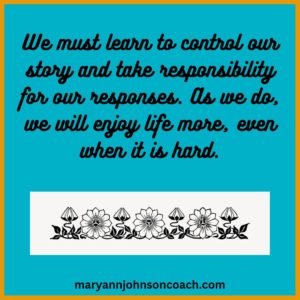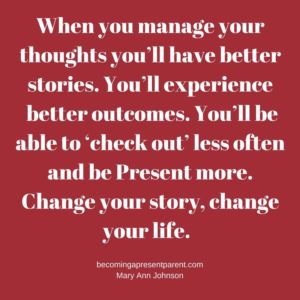 Last week, I shared my daughter’s journey from a traumatic brain injury to a life of love and service. I shared one of the secrets to her success – she had taken charge of what she focused on.
Last week, I shared my daughter’s journey from a traumatic brain injury to a life of love and service. I shared one of the secrets to her success – she had taken charge of what she focused on.
I, like my daughter, put ideas on my wall.
I post on my walls thoughts and ideas that I want to understand and incorporate into my life and way of being. I am a person who decries clutter. Order is the name of the game for me, so it hasn’t always been easy to put things on my wall. LOL However, I have experienced the value of this practice, and I embrace it.
I have shared that I was mad when I learned that I was 100% responsible for my choices. I didn’t believe it. It couldn’t be true. It took me ten years to accept the truth and begin living it. Giving up a victim mindset can be a challenge.
I have lived this truth for many years now, and I know from experience that it is life-changing when we know we are in control of our response. This one principle has made a significant difference in my life. One thing that I do to help myself stay out of victim mode and manage my stories and response to them, is to post on my walls things that help me maintain perspective. I choose ideas I want to understand more fully and live better, thoughts that buoy me up and give me solace. I also focus on things that are not yet part of how I am, because I know that reading them often will help me integrate them into my way of being.
I thought it would be fun to share some of what I have on my walls with you. If it resonates you may want to post it on your walls. If not, enjoy the read and then find what does resonate. I have many thoughts from spiritual leaders in my faith. You will find the same in your faith. I have quotes from people I trust or admire. Some come from books I have read. If it rings true or is principle-based, it can find its way to a wall in my home.
I apologize because I haven’t always put the source on the quote. However, I will share the source if I know it. : ) Even though I don’t always recall where I heard certain words and phrases, it doesn’t matter. They captured my heart in the moment, and I put them on my wall.
I will explain why some quotes are on my wall. It will help you going forward to find great thoughts for your walls.
25 Wonderful Thoughts
1. The picture at the top of this article was gifted to me by my granddaughter Mary, when she was ten. She said, “Grandma, you and I are the same.” I hung her drawing on my wall to remind myself that those I love are watching me, and I need to be careful to be worth watching and emulating. Also, the sentiment is true, there is beauty everywhere, even in the hardest times. There are days when I need to be reminded of this truth. (See Photo)
2. I have this painting on my wall, among the quotes, because it has deep meaning for me. The words came in a dream, and I held them in my heart for years. Eventually, I found a friend and distant relative who painted the dream. It reminds me of what I’m here to do. “Mission Statement – The Savior is healing me. I release old wounds and baggage. As I heal, I am healing generations. I feel satisfied bringing light to others.” Mary Ann Johnson
came in a dream, and I held them in my heart for years. Eventually, I found a friend and distant relative who painted the dream. It reminds me of what I’m here to do. “Mission Statement – The Savior is healing me. I release old wounds and baggage. As I heal, I am healing generations. I feel satisfied bringing light to others.” Mary Ann Johnson
3. “Whatever my lot thou hast taught me to say, it is well with my soul.”
I heard this in a story told on a Christmas program a few years ago. A father lost his four daughters in a tragic sea accident. He immediately sailed to his wife’s side. As he passed over the place, in the ocean, where his daughters were lost, he said these words to himself. This is how I want to manage loss and suffering.
4. I read the book The Happiness Project by Gretchen Ruben. As she suggested, I wrote my own happiness commandments. I pondered for many days and finally narrowed my personal commandments down to these three. This card has been on my wall for many years. These personal commandments have had a huge impact on my way of being.
5. “I like to think of waiting in terms of a waiter at a restaurant. In this sense, to wait on someone is to serve that person. A good waiter – or server – gives his or her customers excellent care and attention by checking on them often, learning their desires, and attending to them. When I adopt this attitude toward the Lord, it adds purpose to the time I spend awaiting a particular blessing. Time seems to pass more quickly when I am diligently working to serve God. Ironically enough, it’s through this work that I ‘renew strength.’ ” From a talk by Christy Nielson
6. “What is the great cause of Christ? It is to believe in Him, love as He loved, and do as He did.” From a talk by Dieter F. Uthcdorf
7. “God’s prosperity is the power to press forward despite the problems of life.” From a talk by L. Whitney Clayton
Many years ago, I was in a very lean time, and I asked God, in prayer, to bless me with prosperity. He did. It was the most amazing year of my life and I felt so much abundance. Our income did not change. In fact, nothing changed except how I felt about my life. It was amazing. Years later I saw this quote and I knew exactly what it meant!
8. “Both abundance and lack exist simultaneously in our lives, as parallel realities. It is always our conscious choice which secret garden we will tend…when we choose not to focus on what is missing from our lives but are grateful for the abundance that is present – love, health, family, friends, work, the joys of nature, and personal pursuits that bring us happiness – the wasteland of illusion falls away and we experience heaven on earth.” Sarah Ban Breathnach
As I said in #7, I have lived this!
9. “Let us therefore come boldly unto the throne of grace, that we may obtain mercy, and find grace to help in time of need.” Hebrews 4:16 From the King James Bible
10. “Life is incredibly unfair – in your favor.” Jennie Taylor
Jennie’s husband was killed in war, and she was left with a family to care for. I listened to her talk about navigating that terrible loss and I was moved beyond words. I was also chastened for my penchant to complain. Jennie taught me the power of these words and also these… “We want everything to happen for a reason. A better mindset might be to let God make reason of everything that happens.” Jennie Taylor
11. When I became a full-time caregiver and made the choice to let my career go, I got a lot of flack from people. Many business associates felt that I was taking the easy way out, business building can be a challenge. Others felt I could do it all if I really wanted to. I spent time pondering and praying. Eventually, I wrote this statement for myself so I would never again second guess the choice I had made. I have it on my wall because caregiving is stressful. It has many challenges and few of the perks of being a teacher and speaker. I must remind myself who I am, why I am doing what I do, and that it is right for me, at this time. Three years have passed, and this is as true today as it was the day it was written.
“So here is my clarity – It won’t be what you would usually think. I live in a four-generation household that is filled with active children and those who are ill. I am also a published author, teacher, and coach. I post daily on Facebook, a meaningful thought for the parents I write for. I write and publish an article each week, which always elicits comments of hope from my readers. My published book is fabulous, and the day will come when I will again promote it and speak and teach on the contents. I have a couple more amazing books in files on my computer which will wait patiently for me. But for now – I am caring for my mother and my ill husband, and helping my daughter care for her 14-year-old with special needs. This is my path, my mission for now, and my time to serve and patiently wait. It is enough for me.” Mary Ann Johnson
11. “Celebrate endings because they precede new beginnings.” Jonathan Lockwood Hule
When I read these words, I knew I had to post them on my wall because I balk at change. I knew that I needed more flexibility of mind and heart. I read these words often.
12. “I will not leave you comfortless. I will come to you.” John 14:18 From the King James Bible
13. “You can’t wait until life stops being hard to be happy.” Jane Marczewski
Jane was known as ‘Nightbirdie’ on the show America’s Got Talent. She had cancer but decided to audition anyway. Simon Cowell gave her a Golden Buzzer. Jane died before the end of the season, but she had lived these words spoken on stage. I don’t watch TV, but my husband does and while doing dishes I saw Jane’s first appearance. Much later I learned she had died. I decided that her words would help me in the years to come and so I searched for them. They are now on my wall.
14. “We can feel heartbreak and joy at the same time.”
15. “Create a vision, present it to the Lord, tell Him this is what you would love, and then ask Him to help you identify your next ‘right’ step. You don’t even have to be totally confident that He is guiding you. If you do this exercise, then I assure you, as you give it your best shot to move forward with the next ‘right’ step, He is.”
16. “Be less worried about what you are doing and think more about who you are becoming.” From a talk by James E. Faust
 17. I took a wonderful class on money stories from Erin Mathis Feik. I worked on my money stories for over fifteen years. I had made tons of progress, but Erin was a friend and I decided to see what she had to say. Here is what I distilled from the class. I read these words often and find them helpful, especially in these current, challenging financial times. (See Photo)
17. I took a wonderful class on money stories from Erin Mathis Feik. I worked on my money stories for over fifteen years. I had made tons of progress, but Erin was a friend and I decided to see what she had to say. Here is what I distilled from the class. I read these words often and find them helpful, especially in these current, challenging financial times. (See Photo)
18. “Not what we give, but what we share. For the gift without the giver is bare, who gives himself with his alms feeds three, himself, his hungering neighbor, and me.” from The Vision of Sir Launfal by James R. Lowell
I have this posted next to a small picture of Jesus Christ, on my bathroom wall. I see it every day.
19. “God sometimes calls us into service at the most inopportune times. Often, we find a hundred reasons to say no…God wants our availability. He wants our hearts and minds and lives. He wants us to say in the words of Isaiah, ‘Here I am, send me.” God does not judge us by a set of standard performances. He makes a total claim on our lives and expects full use of all our talents. He judges us in terms of what we are capable of doing. In many situations, is not a call simply a realization of a need and an agreement that you have the ability to fill that need if you are only willing to do so?” Millard Fuller
When someone needed to care for my mom who has Alzheimer’s, I was traveling the country, speaking, guiding workshops, and really enjoying myself. I had just had a book published. My husband was already struggling with his health, and I was helping my daughter care for her special needs daughter. I knew the decision to take my mom into my home would come at a cost. However, I didn’t know the cost would be as high as it proved to be. Eventually, I had to let it all go, the speaking, the teaching, the traveling.
I have never regretted the decision, but resentment can come knocking, and maintaining perspective can be a challenge. When I read these words, I had to post them on the wall because this is where I find myself today. They help me stay in a good place so I can better love and care for those I serve.
21. “Being a widow is uncharted territory. It is a place of paradox-empty/full, heartbroken/healed, etc. Sometimes I miss so much I can’t breathe. Yet, having him helping from the other side of the veil has been incredible. Soooo many blessings.” Kim Gleason Davis
I have worried about losing my husband since the day we married. That is because he has been a truly safe place for me. I have talked to dozens of widows over the years to hear their stories, so I could be prepared for the day that this safety left. I know it is silly, but there it is.
However, I have known for a long time now that there are some things you can’t prepare for. When I read this post from my friend, Kim, I had to save it because I will need it in years to come. It resonates with me so powerfully because for decades I have said, “Don is my breath. How will I breathe when he is gone?” Kim reminded me how.
22. “Intelligence isn’t in you; it exists around you and you are to connect with it. Answers don’t have to be in your mind. You don’t have to be able to recall everything you read. You just trust that you are an intelligence in a sea of intelligence and answers and information will flow into you. When you begin pondering something and start talking about it, information flows in.”
As I have aged, my ability to recall details has diminished. I was frightened at first, but then I read this, I believed it and I hung it on my wall. I always seem to find the information I need whether it comes readily to my mind or not. Information, when I need it, does flow in!
23. “Nothing in nature lives for itself. Rivers don’t drink their own water. Trees don’t eat their own fruit. The sun doesn’t shine for itself. Flowers don’t spread fragrance for themselves. Living for others is the rule of nature.”
I come from a time when this was lived more than now. I have watched the world become more selfish and self-centered. I need this reminder to remain as I was taught, to take good care of yourself so you maintain your strength and then care for others.
24. “The Lord has a plan for me, and it will be a gift.” Mary Ann Johnson
After I quit speaking and teaching, I wondered if I had made the best choice. One day while coming in the back door I had this very clear thought flash into my mind – This will be a gift. I immediately came into my office space and wrote these words down and hung them on my wall. I wanted to remember what I had just been told. Five years have passed since that day, and I am seeing the gift being created!
25. “Charity – Patience is a reverence for the agency of others. The Lord’s commitment to agency is deeper than even your own. When we are patient with others, we are giving them space to use their agency, even if it complicates things for us or is different from what we would do. Patience is cheerfully doing all things as required by God. The fruit of patience is love unfeigned. We must have patience in order to withstand pain and grief without complaint or discouragement, which detracts from the Spirit.”
I asked for the gift of charity over a decade ago. As I began studying it, I realized that charity is made up of multiple ways of being. I have since begun studying the parts of this gift I desire. I have many quotes about charity and its parts on my walls. I cannot become what I don’t understand and practice.
I have so many other wonderful thoughts and ideas on my walls. I mean, I have been collecting them for years. : ) It is only possible to take one down if I have become the words or if they don’t apply anymore. There was no way to share them all with you, but I hope you have enjoyed these twenty-five and the stories that go with many of them. I am sure you can tell what my focus is at this season of my life. : )
Take the time in this coming year to find words that will help you stay on track and keep working towards who you want to become. Take charge of what you focus on.
It will elevate your mind, heart, and life.
 One evening, my husband Don was watching Sci-Fi on TV. I was cooking and could hear it. A man said to a woman, “To heal your wounds, you must see the past clearly.”
One evening, my husband Don was watching Sci-Fi on TV. I was cooking and could hear it. A man said to a woman, “To heal your wounds, you must see the past clearly.” where I live in our four-generation home, for over a year. It’s been nice to have his presence and help. We have all benefited, including Seth. His reason for coming here, from Montana, which he loves, was to take a series of classes to help him do some healing work. You see, no one’s past is trauma-free. It is the bag thing. : )
where I live in our four-generation home, for over a year. It’s been nice to have his presence and help. We have all benefited, including Seth. His reason for coming here, from Montana, which he loves, was to take a series of classes to help him do some healing work. You see, no one’s past is trauma-free. It is the bag thing. : )


 Last week, I shared my daughter’s journey from a traumatic brain injury to a life of love and service. I shared one of the secrets to her success – she had taken charge of what she focused on.
Last week, I shared my daughter’s journey from a traumatic brain injury to a life of love and service. I shared one of the secrets to her success – she had taken charge of what she focused on. came in a dream, and I held them in my heart for years. Eventually, I found a friend and distant relative who painted the dream. It reminds me of what I’m here to do. “Mission Statement – The Savior is healing me. I release old wounds and baggage. As I heal, I am healing generations. I feel satisfied bringing light to others.” Mary Ann Johnson
came in a dream, and I held them in my heart for years. Eventually, I found a friend and distant relative who painted the dream. It reminds me of what I’m here to do. “Mission Statement – The Savior is healing me. I release old wounds and baggage. As I heal, I am healing generations. I feel satisfied bringing light to others.” Mary Ann Johnson 17. I took a wonderful class on money stories from
17. I took a wonderful class on money stories from
 Today, although there are things I could share that would be less time-consuming to write and less emotionally draining, I am telling you about my morning. I am sharing this experience for a reason. After several decades of working on two principles, they can still trip me up. They are also stumbling blocks for many moms I talk with. I have written about them often, and I don’t want to beat a dead horse, but this is pivotal for our happiness and our ability to parent and relationship well.
Today, although there are things I could share that would be less time-consuming to write and less emotionally draining, I am telling you about my morning. I am sharing this experience for a reason. After several decades of working on two principles, they can still trip me up. They are also stumbling blocks for many moms I talk with. I have written about them often, and I don’t want to beat a dead horse, but this is pivotal for our happiness and our ability to parent and relationship well.
 I received a call from my sister, Rozanne. She was giving me an update on a difficult situation in her life. It was such a profound example of taking responsibility for your responses and choosing to let go of suffering, I asked her if I could share the experience with you.
I received a call from my sister, Rozanne. She was giving me an update on a difficult situation in her life. It was such a profound example of taking responsibility for your responses and choosing to let go of suffering, I asked her if I could share the experience with you.

 I recently finished reading The Choice. The author, Dr. Edith Eva Eger, spent part of her teen years in Auschwitz. She shares things she learned while there, after she left, and while working as a psychiatrist with other trauma victims. It was gut-wrenching and not a pretty read. I had to endure a bit of foul language. It went with the territory.
I recently finished reading The Choice. The author, Dr. Edith Eva Eger, spent part of her teen years in Auschwitz. She shares things she learned while there, after she left, and while working as a psychiatrist with other trauma victims. It was gut-wrenching and not a pretty read. I had to endure a bit of foul language. It went with the territory. Mary, was six, she loved to watch the fish in our tank. We have a very sleek, silver catfish that swims fast and erratically whenever anyone stands in front of the tank. I believe the fish does this out of fear or because it has been disturbed.
Mary, was six, she loved to watch the fish in our tank. We have a very sleek, silver catfish that swims fast and erratically whenever anyone stands in front of the tank. I believe the fish does this out of fear or because it has been disturbed.




 Recently I was taken back in time as I listened to a soundtrack by John Denver. He was a singer-songwriter from the1960s through the 1990s. I was a young teen when he began his career and I enjoyed his music.
Recently I was taken back in time as I listened to a soundtrack by John Denver. He was a singer-songwriter from the1960s through the 1990s. I was a young teen when he began his career and I enjoyed his music.